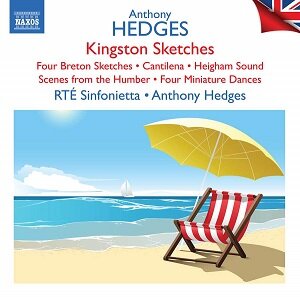
Anthony Hedges (1931-2019)
Four Breton sketches, Op.79 (1980)
Cantilena, Op.87a (1983)
Heigham Sound, Op.72 (1978)
Four Miniature Dances, Op.29 (1967)
Scenes from the Humber, Op.80 (1980)
Kingston Sketches, Op.36 (1969)
RTÉ Sinfonietta/Anthony Hedges
rec. 1995, O’Reilly Hall, Dublin
NAXOS 8.574324 [61]
Although it is advertised (on the disc label only) as being the twelfth issue in the Naxos releases of “British Light Music”, this reissue differs somewhat from its predecessors in the series. Whereas most of the earlier volumes had contained comprehensive surveys of the music of their composers over their extended careers, assembling a host of basically miniature pieces designed originally for LP or SP issue, this volume concentrates on music from a specific period in the career of Anthony Hedges, in particular the years following his appointment to the music faculty at the University of Hull in 1962 and covering the following pair of decades before this recording was made in 1995 – the composer died some fifteen years later. And the pieces included are less of the comparatively short “lollipops” found in other Naxos surveys, consisting as they do (with two exceptions) of suites of three or four movements linked by titles and clearly intended to form more substantial fare than the music of (say) Robert Farnon or Ron Goodwin. Indeed, one or two of the pieces here depart altogether from the field of what I would describe as light music, bordering on the realm of the miniature tone-poem as found in the output of more ‘serious’ composers such as Foulds or Bax.
Actually Hedges, who presumably inspired the booklet note by John Dixon, seems to have disclaimed any such lofty ambitions – on more than one occasion it is pointed out that the composer specifically denied that his music had any “programmatic element.” That statement applies surprisingly to such pieces as Heigham Sound, the lengthiest single movement on this disc and one which stands outside the sets of descriptive suites. But then we read that the piece was originally entitled simply A Holiday Overture and was expanded from these beginnings after the composer decided that the music demanded further elaboration. Indeed there seem to be no obviously descriptive elements of the landscape of the Norfolk countryside here, any more than there are of the Breton scenery in the Four Breton sketches which open the disc. The winsome waltz St Lunaire, reminiscent of Walton in one of his more waywardly eccentric Mediterranean moods, has no real sense of a specific location, and indeed seems like a very close cousin indeed to the Whitefriargate waltz in the composer’s earlier Kingston Sketches (named, of course, after Kingston-upon-Hull rather than Kingston-upon-Thames). The most attractive movement in the Breton suite is the second movement nocturne Sables d’or, which has a fully romantic theme developed with real passion and emotion; the car horns which punctuate the promenade at Dinard in the third movement sound feeble by comparison with Gershwin’s exuberant Parisian honking.
The four miniature dances, the earliest pieces on this disc and written for the composer’s children, are really lightweight (indeed featherweight) pieces, as may be discerned by their whimsical titles such as Fiona’s fancy and Debbie’s delight. The Kingstone Sketches are similarly devoid of any serious or deeper intent; but the same cannot be said for the first two of the Scenes from the Humber written nearly twenty years later. In that suite even the concluding Humber Keel Hornpipe is loaded with unexpected and rebarbative rhythmic eccentricities, but the real seriousness of purpose is reserved for the first two movements. The Petuaria Patrol, a depiction of a Roman legion marching across the fenland, clearly owes something to the final section of Respighi’s Pines of Rome, but the quiet conclusion as the march fades into the distance gives the whole movement a more melancholy air. And the depiction of the flat coastland of the Spurn Point Elegy, complete with whirling seabirds and gusting winds, is really something very special, a haunting evocation of space and time which transcends anything else on this disc – or indeed anything that could normally be regarded as light music. The atmosphere of Moeran’s Lonely waters and Bax’s On the seashore are not far distant, and this miniature tone-poem could well hold its place in any concert of English pastoral idylls. It is, moreover, beautifully evoked by the playing of the RTÉ Sinfonietta, whose rendition of the music under the baton of the conductor is generally all that could be wished. Although I might have welcomed a little more warmth and emotion from the oboe soloist and strings in the Silver Street romance movement of the Kingston Sketches, the recorded acoustic and sound is otherwise admirable.
The booklet notes by John Dixon, which appear to have been updated to take cognisance of Hedges’ death in 2019, are generally comprehensive and seem to have been guided by the composer’s information regarding the genesis of the music, and his evident pride in the popularity that some of the pieces clearly achieved. As such this makes an excellent, if somewhat out-of-the-general run, addition to the reissues on Naxos of their Marco Polo recordings from the 1990s. Reviewing that original Marco Polo release for this site in August 1999, Paul Conway lamented the lack of recordings of Hedges’ more serious music such as his two symphonies; unfortunately in the succeeding quarter century it does not appear that anybody has taken up the challenge. Given the quality of inspiration in Spurn Point, that does seem a shame.
Paul Corfield Godfrey
Help us financially by purchasing from





















